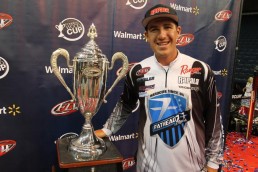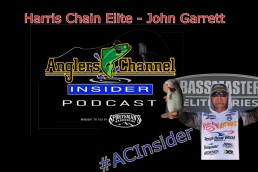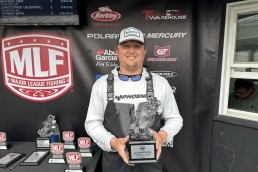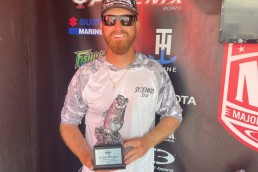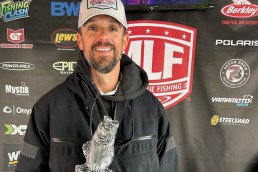Jacob Wheeler On Winning – “decisions, Decisions”
As far as the eye sees, green forested islands stand on brick red shoulders and dominate the waterscape. Here or there, boulders and striated slabs squat along the shore. Delicate clay points carry broken rocks into jade depths that hide uncountable brush piles; brush piles that harbor heavy spotted bass for which Lake Lanier is known.
This is where experts expected an angler to win the 2012 Forrest Wood Cup. This is where many of the 46 best bass professionals on Earth gave their best effort in 25-to-40 feet of water, just a short cast from 100-foot depths.
Team Evinrude pro Jacob Wheeler turned his back on this scenic lake and ventured far up the Chattahoochee River until it narrowed into a dingy creek less than 10 feet deep with nothing to offer a fish except scattered stumps, logs and fallen trees.
This is where Wheeler, age 21, caught 60 pounds, 1 ounce of bass over 4 days, earned $500,000 and became the youngest man to ever win the Cup.
“I spent about 10 minutes in a brush pile the first day (of practice) and said ‘this isn’t it; this is not what I’m doing’. I left. I just committed shallow and said ‘I’m going to stick to my guns and if it works, it works; if it doesn’t, it doesn’t but I’m going to fish my style.” Wheeler caught bigger fish shallow than he did out deep. Plus, once he noticed that fishing was tough all over his decision became clear. “Fishing deep was a grind, fishing shallow was a grind. If I’m going to grind it out, I’m going to grind it out where I’m confident. And I’m very confident shallow. You definitely have to play your game.”
Such decision-making requires extreme confidence in one’s skills and in one’s equipment. The polite young pro from Indianapolis possesses a boatload of each.
And he’s learned to make wise choices.
“When I was 15, 17, 18-years old I felt the most important thing was casting technique so I spent all my time making sure I could cast, skip under docks with a baitcaster or spinning rod at any angle, making sure I could fish any bait out there. If I didn’t know how to fish a bait, I wanted to know how to fish it and I went out there and fished with it. And I thought that was the most important thing until I realized that was only one piece of the puzzle.
“Then came ‘understanding how to make good decisions’. Then it became ‘how to make decisions on the water under tough conditions’.”
Such a decision was waiting for Wheeler as soon as he shut off his E-tec and stood on the trolling motor the first morning of the tournament. “The first thing, I pull up in one of my main areas – I felt like that area had a majority of two-and-a-half, two-and-three-quarter-pounders so I could catch 12 or 13 pounds pretty quick.” Given his considerable experience on Indianan’s White River, Wheeler suspected his best spot could have been muddied by recent rain. “I ran up there not knowing, but I figured I had to go check it to see if it was blown out or not. When I got to the farthest bridge up it was almost chocolate milk. I realized pretty quickly, within 3or 4 minutes, that I needed to move.”
Wheeler then moved back down river until he found cleaner water. The rest, as they say, is history: “I caught a couple of really big fish within that first hour.” Hours later he revealed a 5-bass limit that weighed an ounce shy of 22 pounds and gave him a lead he would never surrender.

Water quality was also on Wheeler’s mind when he made a key decision on the morning of the 4th, and final, competition day. With the dozen or more spectator and media boats following Wheeler in a narrow river he knew he was fishing a scorched earth pattern. “If I run through it there are 12 more boats that are going to run through that same area. That might trash it. So I knew that if there were a couple of bonus fish in those areas, whether they were my best areas or not, I just didn’t want to ruin them. I wanted to take advantage of them first thing in the morning.” For that reason Wheeler stopped short and fished his way into his best water instead of running straight to it.
Wheeler’s mature decision-making skills have impressed onlookers. Combine the wisdom of a sage with the guts of a gunslinger and it is little wonder that FLW Outdoors tabbed Wheeler the ‘the sport’s next superstar’ months before he won the 2012 Cup.
One decision anglers often face is whether to make a long run to unspoiled water or to slug it out against a crowd of competitors in a known hot spot. Wheeler was equipped to do either.
“If you feel like you have a leg up on the competition, that’s when you go to the crowd. You have to be very confident to fish in a crowd.”
While Wheeler could have banged it out with others, Lake Lanier offered the relatively small tournament field a chance to spread out. Wheeler spread farther than anyone else both, on the water, and on the leader board. He fished farther up the Chattahoochee River than did anyone else. He also had a back up plan that took him nearly down to the dam.
“I never caught two fish off the same piece of cover,” said Wheeler of his river fish. But the bass down in the lake were taking turns raiding bream beds. “It was all about where the bluegill beds were. Some had fish on them; some didn’t but the ones that had fish on them replenished. There might have been 4 fish around a bed in practice and 2 totally different fish there during the tournament. There were just fish in the area. A lot of it had to do with deep water access. Those fish weren’t just shallow water fish. They would move up and hang around an area for hours on end just watching, studying the bluegill.”
Wheeler saved those bream bed bass until he needed them. “Why catch a two-and-a-half pound fish when it helps me little, or not at all, instead of saving it for the last day?”
Many pros lamented an inability to trick visible bass into biting. Wheeler’s cure was a 5-inch flutter worm, watermelon/red on a wacky hook for fish that were in less than 3 feet of water. “They were catchable because they were up there and they only had a certain amount of water between them and the surface. So you could catch them on a wacky worm but when those fish were deeper, say, 5-to-6 feet of water, I felt like those fish were tougher to catch because they had so far to come up. When they were in 2 feet of water they just sharked it – they were coming to get it no matter what.”
Wheeler also called up quality bass with an X-Rap Prop, an elongated lure which differs from bream-shaped prop baits favored by locals. Again, he followed his gut rather than following the crowd.
The decision to make that run late on the last two days underscores Wheeler’s belief in his Evinrude. “Having the highest quality equipment on the water is very important. Knowing that when you get behind that steering wheel and you hear it start and you have not even a little worry in the world that that motor was going to start and get you back in, that’s where tournaments are won because you can put that worry out of your mind. I didn’t worry one bit with my Evinrude. On the 3rd day I made an hour run just to fish two banks and run straight back for another hour and never thought twice about it. That really just shows you how much confidence I have in my Evinrude, knowing that no matter what, when I hit that ‘start’ button it’s going to start up and get me where I want to go and get me right back to the weigh in so I can weigh my fish.
“There was no hesitation, even with a half-million dollars on the line.”
With five fish in the livewell Wheeler pointed the sharp prow of his Ranger 521 into the ridiculous waves piled up from all directions by the barrage of big boats that cover Lake Lanier on any warm weekend. “I tell you, that last day it was bad. It was bad. My camera man was like ‘what the heck’ I said ‘I know, but it’s OK’. With an hour to go in the tournament I made a run just to go fish one bluegill bed. I didn’t catch any but you can never be satisfied and I had 11 pounds. But I’m 100% confident in my equipment.”
Wheeler insists that decisions, and confidence in those decisions, are what separate champions from everyone else. That’s why he owns the 2012 Forrest Wood Cup. “It was definitely decisions throughout the tournament – gutsy decisions – but the confidence that I have in my boat and my motor is second to none. They always get me there and back.”
That confidence was rewarded as thousands watched Wheeler weigh-in one last time.
As workers swept foil confetti across a scarlet carpet on the floor of the mostly empty arena fellow Team Evinrude pro and 2011 Forrest Wood Cup Champion Scott Martin shook Wheeler’s hand. “You’re crafty,” said Martin. “That’s what it takes to make it in this sport.”
